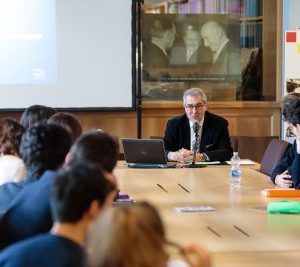Welcomed by the management of the European University Institute of Archives in Florence, I made two speeches, one in front of students from the Victor Hugo High School who were participating in a com- petition on Europe and the next day in front of the think tank “Thoughts of Europe” made up of researchers and who are making a great effort to explain how the EU works in the perspective of the next European elections. With the students, after having presented the functioning of the European institutions and particularly that of the parliament, I had a great moment of exchanges with the students and their teachers. The questions were mainly related to the themes of the competition in which they participated: European democracy, energy and climate, institutions, etc.
In groups, they presented me with the results of their re ections and I had to comment on them. Obviously what interests young people most is their future, the Europe they are hoping for and its ability to offer an area of peace, freedom and solidarity with a particular focus on the issue of immigration, which concerns young people, particularly in Italy, with the arrival of a new government that refuses access to migrant boats but also the Dublin agreements, which are very critical in their eyes. Everything that allows exchanges between young Europeans is plebiscite and in particular the Erasmus+ programme; on the climate energy issue, exchanges are less consensual with the question of the energy mix and the choices between nuclear and fossil fuels: the consensus is however on renewable energies and energy savings. All the students are concerned about global warming, which they have understood is not a myth and the fear of climate immigration after humanitarian action is real; on the question of democracy in Europe, they consider that it is the European Parliament that is the most legitimate and that it is necessary to make citizens aware of the European elections – which I have been careful not to deny!
Exchanges that are particularly interesting and well prepared by the teaching team. With the researchers of the think tank, it was the institutional issues that formed the common thread of the exchange: I had chosen to introduce the debate with the budgetary question by explaining the dif culties of conducting more and more numerous and desired policies without new budgetary resources independent of the states: the Monti Commission was of course raised with the question of a federal Europe or the addition of states, and with the students the day before the question of the exercise of democracy in the Union was raised with the particular role of parliament in the run-up to the elections by universal suffrage.
“Thoughts of Europe” is concerned about the lack of communication with citizens despite the efforts of the institutions, which are in-suf ciently covered by the media. It intends to make its contribution for the next few deadlines, which deserves to be highlighted and encouraged.


